'Intuitive' Therapy Cat and Owner Who Share Similar Limb Differences Work to Spread Cheer (Exclusive)
Juanita Mengel and her cat Lola Pearl both have had there left leg amputated
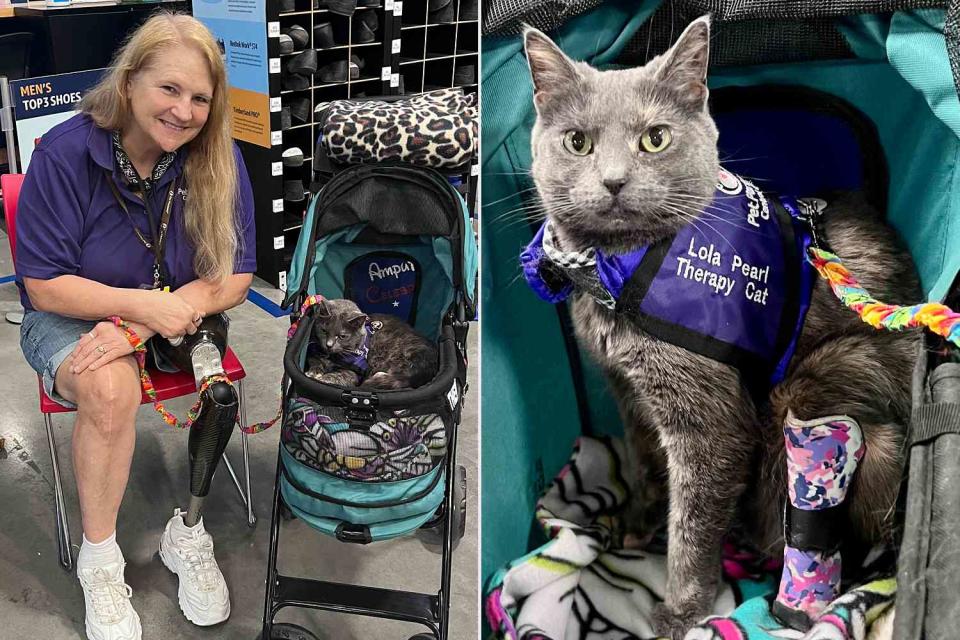
Courtesy of Juanita Mengel
Juanita Mengel with her therapy cat, a dilute tortoiseshell calico named Lola PearlLola Pearl's favorite hobby is bringing smiles to others.
The dilute tortoiseshell calico is a rescue cat who has experienced a lot in her five years on Earth. Juanita Mengel, the feline's owner, first heard about Lola Pearl in 2018 when a friend who works with Green Hills Animal Shelter in Trenton, Missouri, told Mengel about a kitten who came in "with her little back legs all twisted."
Mengel's friend got the kitten set up with Animal Lifeline of Iowa, a shelter dedicated to caring for rescue animals with special needs. Lola Pearl switched shelters to gain access to more veterinary care.
Animal Lifeline's vets found that Lola Pearl was "missing bones in her ankles," Mengel tells PEOPLE.
At first, vets thought both of the kitten's back paws would need to be amputated, but after putting the growing cat's limbs in splints and doing months of physical therapy while the legs developed, the experts determined in early 2019 that only Lola Pearl's back left leg would need to be amputated.
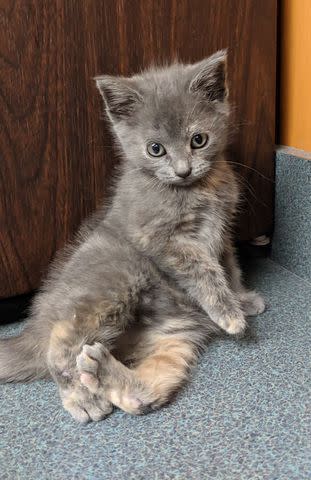
Courtesy of Juanita Mengel
Lola Pearl as a kitten before her amputation operationWhen Mengel learned from her friend that the kitten would undergo an amputation operation, she confirmed her interest in adopting Lola Pearl. And when Lola had only one leg amputated, Mengel felt even more connected to the cat.
"She just had to have the one back left leg done. It's funny because it's the same leg I had done," Mengel says of the limb difference she and her cat share.
Related: Students Create Prosthesis for Teacher's 3-Legged Golden Retriever: 'Our Kids Are so Smart'
"The big thing with her is they wanted to find somebody that knew about prosthetics, and of course, I'm an amputee that knew about prosthetics," she adds about why adopting Lola Pearl, who joined Mengel's 6 other cats, was an easy choice.
In June 2019, Mengel picked up Lola Pearl from Animal Lifeline and brought the new pet back to her home in Amanda, Ohio.
Lola Pearl settled in a well. Mengel makes a point of helping the cat feel comfortable with the foam prosthetic she uses to walk, run, and play.
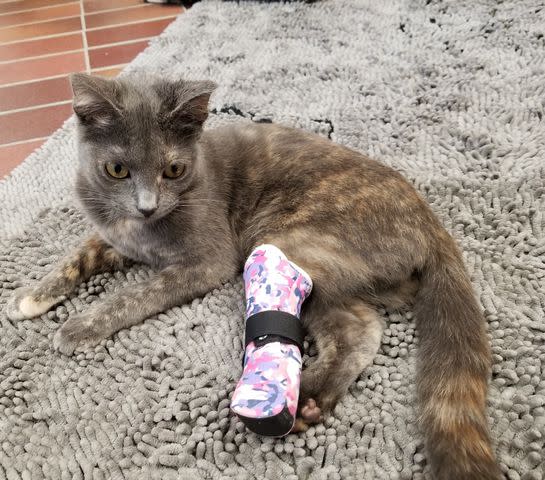
Courtesy of Juanita Mengel
Lola Pearl the therapy cat wearing her foam prosthetic over her amputated left leg"I put it on her every morning when I put mine on," Mengel says of the pair's prostheses.
The pet parent also takes time to warm Lola Pearl's prosthetic leg in the winter, as she does with her own, to ensure the feline doesn't get chilly when she puts on the medical device.
Lola Pearl recently got an updated prosthetic leg, a piece that Mengel's prosthetist made.
Shortly after bringing Lola Pearl home, Mengel decided to take the cat with her to an amputee conference.
Related: Abandoned Dog with 6 Legs Has Surgery to Remove Extra Limbs: 'Procedure Went Very Well'
"I took her down there, and she was wonderful. People loved her. They were fascinated that she had a prosthetic too. It was just great," Mengel recalls.
Following this experience, Mengel "knew" Lola Pearl would make a good therapy pet.
"She was so friendly," Mengel says. "She loves the attention."
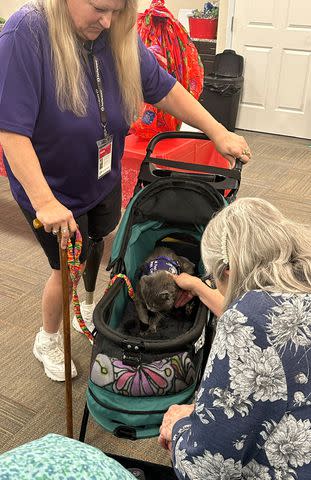
Courtesy of Juanita Mengel
Juanita Mengel and Lola Pearl the cat during a therapy pet visitAt this time, Mengel had just retired her previous therapy cat, Brucey, who was starting to lose interest in travel in his old age. So Mengel got Lola Pearl registered as a therapy pet with Pet Partners, the same organization that Brucey volunteered with.
According to C. Annie Peters, the president and CEO of Pet Partners, 94% of the organization's registered volunteer therapy pets are dogs, but that doesn't mean that cats aren't suited for the rewarding work.
"There are a lot of cats that absolutely could be suited for this kind of work. Some of it is innate personality. Some of it is socialization as well," Peters says.
"Pet Partners, 2024 is the year of the cat; we have a big push to get more registered cat teams, especially with our nursing assisted living visits. Not everyone's a dog person. Imagine if you have spent your entire life surrounded by cats, and now you're no longer in your own home — having a cat visit you once or twice a week can make all the difference in your mental health and well-being," she adds.
Pet Partners, which also certifies "mini horses, llamas, birds, Guinea pigs, pigs, rats, and rabbits," says the first step for getting your pet certified as a therapy animal is ensuring your pet wants to do it.
"The most important thing is that the animal wants to do this work," Peters says.

Courtesy of Juanita Mengel
Juanita Mengel and Lola Pearl the cat visiting an amputee conferenceInterested pet and owner pairs can apply to start the certification process at petpartners.org. Volunteer handlers then take a safety course, followed by an evaluation with their pet.
"Once you pass that, you are ready to register, and you go through the final steps with us," Peters says.
Once registered, Pet Partners pet and handler teams go through reevaluation every two years.
Related: N.J. Animal Shelter's 'Neuter Your Ex' Special for Valentine's Day Has 'Absolutely Taken Off'
Since registering with Pet Partners, Lola Pearl has visited dozens of animal lovers across various types of locations.
"We've gone to extended care facilities. We've visited people with mental health issues. We've done some hospital staff visits, especially post-COVID," Mengel shares.
"Amazon wanted Pet Partners to come in, and we did a project with them where we would catch workers during a shift change," Lola Pearl's owner adds.
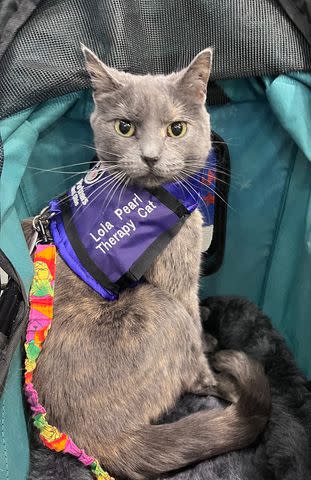
Courtesy of Juanita Mengel
Lola Pearl wearing her therapy pet vestMengel says the rescue cat makes an ideal therapy cat because she is "intuitive."
"When we go to Amazon, she can tell when people are really stressed out," she explains. The owner adds that when visiting extended care facilities, Lola Pearl knows to give extra lap time to the residents who owned cats before moving in.
The sociable pet is also a hit with schoolchildren and the attendees of the amputee support groups Mengel visits.
Never miss a story — sign up for PEOPLE's free daily newsletter to stay up-to-date on the best of what PEOPLE has to offer, from celebrity news to compelling human interest stories.
"They just love her. And it depends on who the people are, too. When you go to elementary schools, the kids just want to pet her," she says.
"You can see people's faces relaxing," Mengel adds. "It's very rewarding. I get as much out of it as they do."
For more People news, make sure to sign up for our newsletter!
Read the original article on People.

 Yahoo Lifestyle
Yahoo Lifestyle 
